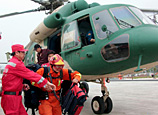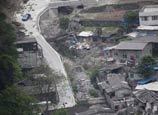
BANDAR SERI BEGAWAN, April 23 (Xinhua) -- The 22nd Association of Southeast Asian Nations (ASEAN) Summit is due to open here on Wednesday under the theme "Our People, Our Future Together", bringing the bloc one step closer to an ASEAN Community.
The community building process started in 2003 when the heads of ASEAN member states agreed at the 9th ASEAN Summit that an ASEAN Community shall be established.
At the 12th ASEAN Summit held in January 2007 in Cebu of the Philippines, the leaders affirmed their strong commitment to facilitating the establishment of an ASEAN Community by the end of 2015 and signed the Cebu Declaration on the Acceleration of the Establishment of an ASEAN Community by 2015.
The ASEAN Community comprises three pillars, namely the ASEAN Political-Security Community, the ASEAN Economic Community and the ASEAN Socio-Cultural Community. Each pillar has its own blueprint, and, together with the Initiative for ASEAN Integration (IAI) Strategic Framework and IAI Work Plan Phase II (2009-2015), they form the Roadmap for an ASEAN Community (2009-2015).
The ASEAN Charter, which entered into force in 2008, serves as a firm foundation and a significant milestone in achieving the ASEAN Community goal by providing legal status and institutional framework for it. It also codifies ASEAN norms, rules and values, sets clear targets for ASEAN, and presents accountability and compliance.
To gear up capacity building, ASEAN has set up the ASEAN Coordinating Council and three ASEAN Community Councils, including the ASEAN Political-Security Community Council, the ASEAN Economic Community Council and the ASEAN Socio-Cultural Community Council.
At the 19th ASEAN Summit held in Bali, Indonesia, in November 2011, the ASEAN leaders adopted the Bali Declaration on ASEAN Community in a Global Community of Nations, or the Bali Concord III, a historic outcome document which is widely expected to increase ASEAN's active role in addressing global issues and to map out the road for ASEAN's interaction with the global community.
ASEAN leaders also affirmed their commitment to adopt a more coordinated, cohesive and coherent ASEAN position on global issues of common concern which would further raise ASEAN's common voice in relevant multilateral fora, and to develop an enhanced ASEAN capacity to contribute and respond to key global issues of common interest which would benefit all ASEAN member states and their peoples.
At the 21st ASEAN Summit held in Phnom Penh, Cambodia, last year, ASEAN leaders agreed to sign, adopt, and note different documents including the Phnom Penh Statement on the Adoption of the ASEAN Human Rights Declaration, the ASEAN Human Rights Declaration (AHRD), the ASEAN Leaders' Statement on the Establishment of an ASEAN Regional Mine Action Center, the Bali Concord III Plan of Action (2013-2017). They also launched the ASEAN Institute for Peace and Reconciliation while pledging to bring the ASEAN common platform on global issues into reality by 2020.
ASEAN, established in 1967, groups Brunei, Cambodia, Indonesia, Laos, Malaysia, Myanmar, the Philippines, Singapore, Thailand and Vietnam.
















 Local villagers climb mountains to get relief supplies
Local villagers climb mountains to get relief supplies


![]()
